新概念英语第一册117课
新概念第一册 117课笔记
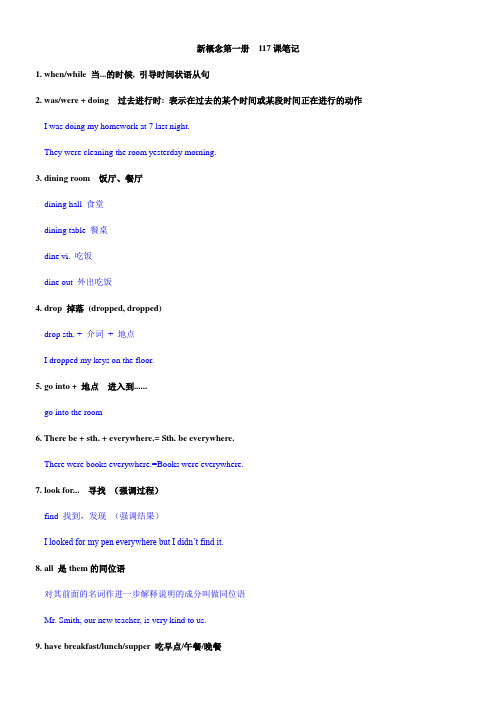
新概念第一册117课笔记1. when/while 当...的时候, 引导时间状语从句2. was/were + doing 过去进行时: 表示在过去的某个时间或某段时间正在进行的动作I was doing my homework at 7 last night.They were cleaning the room yesterday morning.3. dining room 饭厅、餐厅dining hall 食堂dining table 餐桌dine vi. 吃饭dine out 外出吃饭4. drop 掉落(dropped, dropped)drop sth. + 介词+ 地点I dropped my keys on the floor.5. go into + 地点进入到......go into the room6. There be + sth. + everywhere.= Sth. be everywhere.There were books everywhere.=Books were everywhere.7. look for... 寻找(强调过程)find 找到,发现(强调结果)I looked for my pen everywhere but I didn’t find it.8. all 是them的同位语对其前面的名词作进一步解释说明的成分叫做同位语Mr. Smith, our new teacher, is very kind to us.9. have breakfast/lunch/supper 吃早点/午餐/晚餐注意:三餐前不能有冠词the10. put sth. into... 把......放进......put the books into the bag11. both 两个都(1) 放在主语后边,作同位语,表示“两者都......”We both like English.(2) both of + 人称代词(宾格)Both of them 他们两个人=They both...注意:both用于两者,all 用于三者或以上,结构同both,他们的位置通常放be动词后实义动词前12. try to do sth. 试图做某事;努力做某事try doing sth. 尝试做某事13. 过去完成时:had + done过去完成时表示过去某一时间或动作以前已经发生或完成了的动作。
新概念英语第一册自学笔记含课后练习答案:Lesson 117-118

新概念英语第一册自学笔记含课后练习答案:Lesson117-118新概念英语第一册117-118课课文重难点详解 further notes onthe text1.look for,寻找(强调动作过程);find,找到(强调寻找的结果)。
2.tommy had already swallowed them! 汤米已经把硬币咽了下去!句中用了过去完成时形式 had swallowed。
过去完成时用来表示过去两个动作中发生在前的那个动作。
显然,句中咽下硬币的动作发生在夫妇俩能够把硬币从汤米手中抢过来之前。
3.later that morning,那天上午的晚些时候。
later是副词late的比较级。
4.any changechange是个多义词,既有“零钱”的意思,也有“变化”的意思。
此处既可指“硬币”;也可指“情况的变化”。
这是双关(pun /p)n/)修辞法。
新概念英语第一册117-118课语法知识点 grammar in use过去实行时构成: be的过去式+现在分词。
过去实行时表示过去某时正在实行的情况或动作。
过去实行时和一般过去时经常在同一个句子里使用。
过去实行时表示过去正在实行的情况或动作,一般过去时则表示比较短暂的动作或事件。
过去实行时的时间状语从句一般由when,while及(just)as等来引导,说明主句中动作发生时的背景。
此外,可用 while或 at the time等强调同时实行的两种或几种动作。
请看例句:when i was doing the housework, my husband telephoned mefrom the office.当我正在干家务时,我丈夫从办公室打电话给我。
while i was listening to the stereo, my mother came into the room.我正在听立体声节目时,我母亲进房间了。
just as she was cleaning her shoes, george knocked at the door.她正在擦鞋时,乔治敲门了。
新概念英语第一册第117-118课件
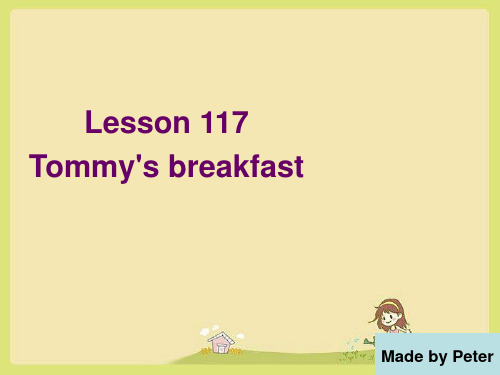
Chinese Breakfast
• • • • • • • • • • • • • 油条 水饺 蒸饺 馒头 饭团 蛋饼 豆浆 稀饭 白饭 蛋炒饭 米粉 馄饨面 酸辣汤 • • • • • • • • • • • • • fried bread stick boiled dumplings steamed dumplings steamed buns rice and vegetable roll egg cakes soybean milk rice porridge plain white rice fried rice with egg rice noodles wonton & noodles hot and sour soup
Joe was reading a book. Carfield was watching TV. while When Joe was reading a book,Carfield was watching TV.
过去进行 时
Grammar
现在进行时: 构成:
主语+is/am/are +动词的现在分词(ing) 过去进行时 (8A U6)
Key words and expressions
• • • • 三天后 回头见,再见 早晚,总有一天 他比平常来得晚 • • • • three days later see you later sooner or later He came later than usual.
★
later
1) adv. 后来,较迟地,较后地 2) adj. 较迟的,较后的,更近的 in one’s later life 我们搭晚一点的火车吧。 Let’s take a later train.
新概念英语第一册117课

❖ ‘How’s Tommy?’ he asked.
❖ ‘I don’t know,’ I answered, ‘Tommy’s been to the toilet three times this morning, but I haven’t had any change yet!’
7. Mike and I___(play) basketball at that time yesterday afternoon.
课文讲解
❖ When my husband was going into the dining room this morning, he dropped some coins on the floor.
o’clock last night.
Practice Time!
1. While she ___ TV, Penny ___ asleep.
A. watches, was falling B. was watching, fell C.was watching, was falling D. watch, fell KEY: B
❖ As the children were playing in the garden, it began to rain.
❖ He put them both into his mouth. We both tried to get the coins. But it was too late. Tommy had already swallowed them!
I was having dinner when he came in.
新概念英语NCE1_lesson117-118(共18页)课件

单词学习
• dinning room(hall) • coin • mouth • swallow • later • toilet
饭厅 n. 硬币 n. 嘴 v. 吞下 adv. 后来 n. 厕所,盥洗室
• coin n. 硬币 • a silver coin 银币 • 你能把这个一美元的纸币换成硬币吗? • Could you change the one-dollar bill into coin? • mouth n. 嘴 • Open your mouth. • 嘴里塞满食物时不要说话。 • Don’t talk with your mouth full! • It sounds funny in your mouth. • 这种话由你的口中说出来,听起来就很可笑。
• later • 1) adv. 后来,较迟地,较后地 • 回头见
• see you later. • 三天后
• t得晚。
• He came later than usual. • 2)adj. 较迟的,较后的,更近的。 • 我们搭晚一点的火车吧。
• Let’s take a later train.
• swallow • ① v. 吞下,咽下
• Tommy swallowed the coins. • ② v. 抑制,使不流露
• I tried hard to swallow my doubts. • 我强忍着不露出怀疑的神色。 • 她忍住没笑,静静地坐在那里。
• She swallowed a smile and sat there still. • ③ v. 吞并;侵吞 • 我们公司去年被一家美国公司吞并了。
新概念英语第一册Lesson117-118笔记(语法点+配套练习+答案)

put ... into ...
把...放到
have/has been to
曾去过某地
四、语法解析
1.现在进行时:说话此刻正在发生
结构:be (am/is/are) + v.ing
时间标志词:Look! Listen! now, at the moment
练习:
1.One of themis taking(take) photos for us now.
11.Didyoufinish(finish) your homework yesterday?
12.Her motherdidn’t give(not give) the girl any present.
13.When hewent(go) back to England, hewass(be) very tired.
The childrenwereallhappy.
Bothof the twins wanted to go to the theatre.
Allof my classmates are invited to my party.
three times三次
现在完成时的标志词
twice两次
once一次
have/has been to去过某地,已回
have/has gone to去了某地,未回
My father isn't at home, hehas gone toBeijing.
Mr Wang isn't here.Hehas gone toQingdao.
My fatherhas been toBeijing twice.
Ihaveneverbeen tothe Great Wall.
新概念英语第1册117课

JIM:Look! Everyone's in the garden. CAROL:Hello, Helen. Hello, Jim. TOM:Everybody wants to have lunch in the garden.
It's nice and warm out here. CAROL:Come and have something to drink. JIM:Thanks, Carol. May I have a glass of beer
• dining room
• coin
n.
• mouth
n.
• swallow v.
• later
adv.
• toilet
n.• ring源自v.饭厅 硬币 嘴 吞下 后来 厕所 响
Key words&expressions
★ coin n. 硬币 (note 纸币)
toss a coin
★ 掷硬币(打赌正面或反面)
dining room toilet
mouth
coin ring
swallow later
toilet coin swallow
later
Questions on the text
• What does she mean by ‘change’ in the last sentence?
Video
Key words&expressions
★ later
1) adv. 后来,较迟地,较后地 • three days later 三天后 • He came later than usually.他比平常来得晚。 • See you later. 回头见,再见。 • sooner or later 早晚,总有一天
新概念英语第一册117课 课件(共17张PPT)
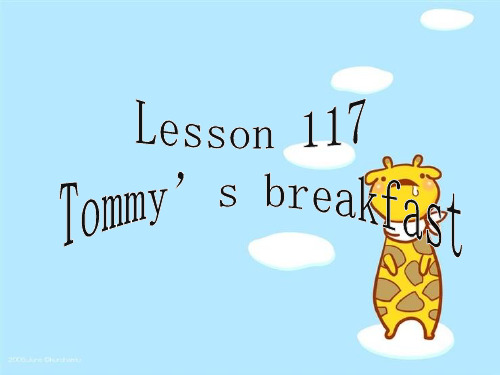
• 5. The train left when I was buying the tickets.
• 6. It rained heavily when I was driving to London.
A. is having B. have C. has D. was having
4. What ____ you ____from 7 to 9 yesterday ? A. were, doing B. did. do C. have, done
5.Look! Lily with her sister __ a kite on the playground.
shaving
cut
Exercise P239
• 1. He knocked at the door when I was answering the phone.
• 2. He came downstairs when I was having breakfast.
• 3. The phone rang when I was washing the dishes.
过去进行时VS现在进行时
结构
现在am/is/are+v-ing 过去was/were+v-ing
The students are drawing pictures now.
The students were drawing pictures when the teacher came in.
3.时间状语:
New words and expressions
dining room
新概念英落第一册117的课文
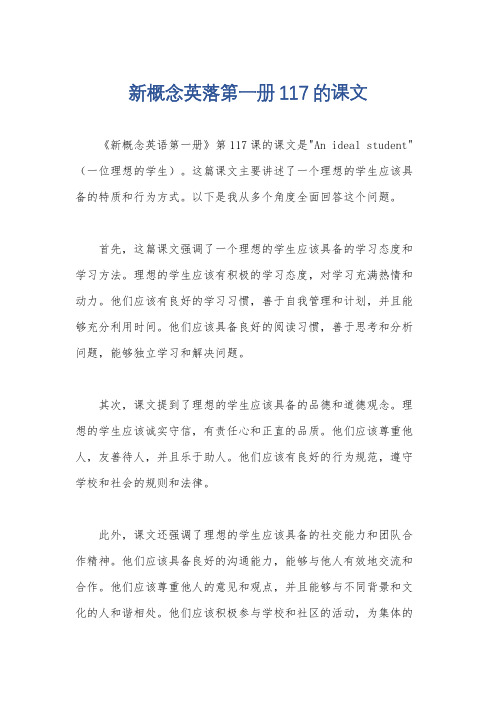
新概念英落第一册117的课文《新概念英语第一册》第117课的课文是"An ideal student"(一位理想的学生)。
这篇课文主要讲述了一个理想的学生应该具备的特质和行为方式。
以下是我从多个角度全面回答这个问题。
首先,这篇课文强调了一个理想的学生应该具备的学习态度和学习方法。
理想的学生应该有积极的学习态度,对学习充满热情和动力。
他们应该有良好的学习习惯,善于自我管理和计划,并且能够充分利用时间。
他们应该具备良好的阅读习惯,善于思考和分析问题,能够独立学习和解决问题。
其次,课文提到了理想的学生应该具备的品德和道德观念。
理想的学生应该诚实守信,有责任心和正直的品质。
他们应该尊重他人,友善待人,并且乐于助人。
他们应该有良好的行为规范,遵守学校和社会的规则和法律。
此外,课文还强调了理想的学生应该具备的社交能力和团队合作精神。
他们应该具备良好的沟通能力,能够与他人有效地交流和合作。
他们应该尊重他人的意见和观点,并且能够与不同背景和文化的人和谐相处。
他们应该积极参与学校和社区的活动,为集体的利益做出贡献。
最后,课文提到了理想的学生应该具备的健康和兴趣爱好。
理想的学生应该注重身体健康,保持良好的生活习惯和饮食习惯。
他们应该有广泛的兴趣爱好,培养自己的特长和才能,并且能够平衡学习和娱乐的关系。
总结起来,理想的学生是一个全面发展的人,他们具备积极的学习态度、良好的学习习惯、高尚的品德和道德观念、良好的社交能力和团队合作精神,以及健康的身心和广泛的兴趣爱好。
这些特质和行为方式使他们成为了一个优秀的学生和未来的有用之才。
希望以上回答对你有所帮助。
如果你还有其他问题,我将非常乐意继续回答。
新概念英语第一册 lesson 117
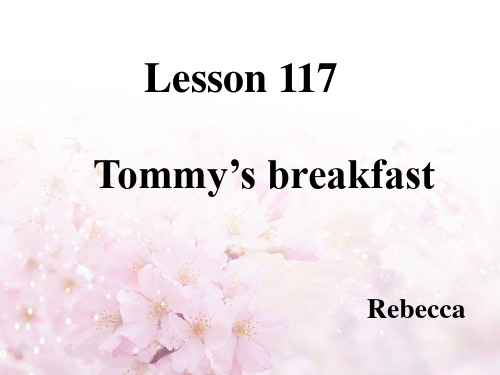
Later that morning, when I was doing the housework, my husband phoned me from the office.
"How is Tommy?" he asked. "I don't know," I answered, "Tommy's been to the toliet three times this morning, I haven't had any change yet!"
The boss arrived when I was typying a letter. The train left when I was buying the tickets.
6. It rained heavily. I drove to London.
It rained heavily when I was driving to London.
Example: He arrived. I had a bath. He arrived when I was having a bath.
4. The boss arrived. She typed a letter. 5. The train left. I bought the tickets.
While we were having breakfast, our little boy, Tommy, found two small coins on the floor.
Tommy's break来自astHe put them both into his mouth. We both tried to get the coins, but it was too late. Tommy had already swallowed them!
新概念英语第一册117课课文
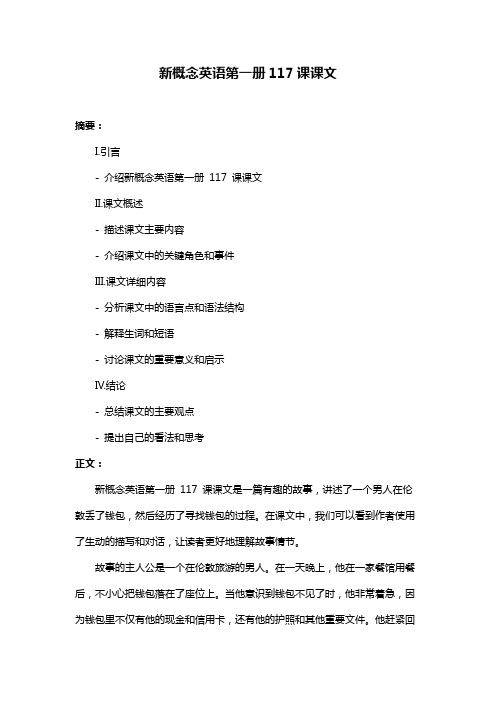
新概念英语第一册117课课文摘要:I.引言- 介绍新概念英语第一册117 课课文II.课文概述- 描述课文主要内容- 介绍课文中的关键角色和事件III.课文详细内容- 分析课文中的语言点和语法结构- 解释生词和短语- 讨论课文的重要意义和启示IV.结论- 总结课文的主要观点- 提出自己的看法和思考正文:新概念英语第一册117 课课文是一篇有趣的故事,讲述了一个男人在伦敦丢了钱包,然后经历了寻找钱包的过程。
在课文中,我们可以看到作者使用了生动的描写和对话,让读者更好地理解故事情节。
故事的主人公是一个在伦敦旅游的男人。
在一天晚上,他在一家餐馆用餐后,不小心把钱包落在了座位上。
当他意识到钱包不见了时,他非常着急,因为钱包里不仅有他的现金和信用卡,还有他的护照和其他重要文件。
他赶紧回到餐馆,但是钱包已经不见了。
接下来,这个男人开始了他的寻找钱包之旅。
他去了餐馆附近的警察局,但是警察局的工作人员告诉他,他们无法帮助他找到钱包。
然后,他又去了他的酒店,向酒店管理人员求助。
酒店管理人员告诉他,他们可以帮助他联系餐馆,看看是否有人捡到了钱包。
在等待餐馆回音的过程中,这个男人感到非常沮丧和无助。
他不知道该怎么办,但是他决定继续寻找。
最终,餐馆联系了他,告诉他有人捡到了他的钱包,并将其归还给了餐馆。
这个男人非常感激,他赶紧去餐馆取回了他的钱包。
这个故事告诉我们,当我们遇到问题时,我们应该保持冷静和耐心,继续寻找解决问题的方法。
在这个男人的例子中,他遇到了困难,但是他并没有放弃,最终他找到了解决问题的方法。
新概念英语第一册第117课(课堂PPT)

117课 过去进行时练习: 一、仿照例句用所给 的词汇造句。
1. I, see him, he, cross the street I saw hi m while he was crossing the street. (He was crossing the street when I saw him.) A. the sun, shine, we, come out B. she, study at college, the war, break out C. she, work in a factory, the city, be liberate d (放) D. he, lose his pen, he, go sightseeing in th e city
17
1. While we __________ (wait) for the bus, a girl __________ (run
) up to us.
2. I __________ (telephone) a friend when Bob __________ (com
e) in.
3. Jim __________ (jump) on the bus as it __________ (move) aw
1
阅读课文回答问题
What does the she mean by ‘change’ in the last sentence ?
2
再看一遍课文
3
When my husband was going into the dining room this morning
4
he dropped some coins on the floor.
新概念英语第一册第117-118课-Tommy’s breakfast
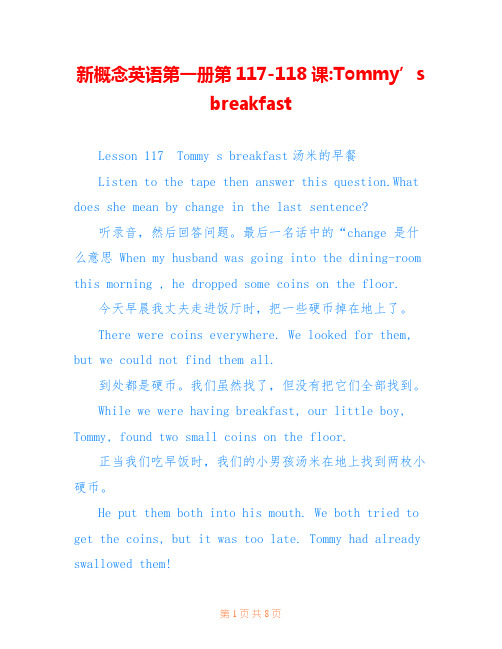
新概念英语第一册第117-118课:Tommy’sbreakfastLesson 117 Tommy s breakfast汤米的早餐Listen to the tape then answer this question.What does she mean by change in the last sentence?听录音,然后回答问题。
最后一名话中的“change 是什么意思 When my husband was going into the dining-room this morning , he dropped some coins on the floor.今天早晨我丈夫走进饭厅时,把一些硬币掉在地上了。
There were coins everywhere. We looked for them, but we could not find them all.到处都是硬币。
我们虽然找了,但没有把它们全部找到。
While we were having breakfast, our little boy, Tommy, found two small coins on the floor.正当我们吃早饭时,我们的小男孩汤米在地上找到两枚小硬币。
He put them both into his mouth. We both tried to get the coins, but it was too late. Tommy had already swallowed them!他把这两枚硬币全都放进嘴里。
我们俩都试图把这两枚硬币拿出来,但太迟了。
汤米已经把硬币咽了下去!Later that morning, when I was doing the housework, my husband telephoned me from the office.那天下午的晚些时候,当我正做家务时,我丈夫从办公室打来电话。
新概念英语第1册117课

敲,打 宁静的,安静的 不可能的 邀请 柠檬水 开玩笑 睡觉,睡着 眼镜
Sophy Mike Rain
Snow Jack Tony
Jerry Bill Linda
lily Betty
Coco
2013-5-9
HELEN:Isn't there anyone at home? JIM:I'll knock again, Helen. Everything's very quiet. I'm sure there's no one at home. HELEN:But that's impossible. Carol and Tom invited us to lunch. Look through the window. HELEN:Can you see anything? JIM:Nothing at all. HELEN:Let's try the back door.
Grammar
1.构成 • was/were +现在分词 • 疑问句式 把 was/were 提前 • 否定句式 在 was/were 的后面加 not • 例:
过去进行时
Grammar
• 2. 如果过去的两个动作同时发生,我们可以用when /while连接这两个同时发生的动作。译作“正当…的时 候”. • 例:
2. there were coins everywhere. 复合不定代词
Every One Everyone No No one Any Anyone Some Someone
Thing
Body
Everything
Everybody
Nothing
新概念英语第一册第117课完整ppt课件

阅读课文回答问题
What does the she mean by ‘change’ in the last sentence ?
精选ppt
再看一遍课文
精选ppt
When my husband was going into the dining room this morning
精选ppt
续的或同时发生的,那么主从句的动词都可用过去
进行时。
精选ppt
本课语法过去进行时
1.过去进行时由“主语+was/were+动词ing”构成 2.过去进行时的否定式由“主语+was/werenot+现 在分词”构成 3.过去进行时的疑问式由“was/were+主语+现在 分词”组成 句型 肯定句=主语+was/were+doing+其它 否定句=主语+was/were+not+doing+其它 一般疑问句问语=Was/Were+主语+doing+其它 答语:Yes,Iwas/were.或No,Iwasn't/were’t. 特殊疑问句=特殊疑问词精+选p一pt 般疑问句+其它
精选ppt
本课语法
1.look for,寻找(强调动作过程);find,找到(强调寻找的结 果)。 2.Tommy had already swallowed them! 汤米已经把硬币咽了下去 句中用了过去完成时形式 had swallowed。过去完成时用来表示过去 两个动作中发生在前的那个动作。显然,句中咽下硬币的动作发生在 夫妇俩能够把硬币从汤米手中抢过来之前。 3.later that morning,那天上午的晚些时候。 later是副词late的比较级。 4.any change change是个多义词,既有“零钱”的意思,也有“变化”的意思。此 处既可指“硬币”;也可指“情况的变化”。这是双关(pun /p)n/) 修辞法。
新概念一册 lesson 117

词汇
词汇
• Later adv.后来 • 就是later的比较级
• 用于句首,叙述性语言,“之后”用作过去时居多 • 用于句尾,“一会”,将来时居多。
• • • •
例句:后来,我学会了如何去爱。 Later, I finally learnt how to love. 一会打给你。 I will talk to you later.
语言点
• 过去进行时 • 概念:过去某一时刻或某一段时间内进行 或者发生的动作。 • 结构: was/ were +V-ing • 例句:他昨天下午正在游泳。 He was swimming yesterday afternoon.
语言点
• 标志符号:与过去时相同,但是进行时要靠上 下文意义判断。 • 常见的:last 表示过去 wபைடு நூலகம்en,while,as 表示进行 当……的时候 例句:当我正在读书的时候,他正在看电视。
词汇
词汇
• Coin n. 硬币(不一定是钱) v. 制造,塑造 例句: 让我们一起塑造他。 Let’s coin him together.
词汇
• Mouth n. 嘴,河流入海口 • 注意读音,th要咬舌头 lips
• Swallow v. 1. 吞下 2.掩饰,抑制 例句:他把一粒葡萄放入嘴里, 整个吞了下去。 He put a grape into his mouth and swallowed it whole. 他抑制住自己的悲痛。 He swallows his sadness.
新概念一册 Class C
Lesson 117 Tommy’s breakfast
• Dinning room 饭厅
• • • • Living room 客厅 Bathroom 洗澡间 Toilet 厕所 Washing room 洗澡间 Bedroom 卧室 Kitchen 厨房 Laundry 洗衣房
新概念英语第一册117课课文

第一部分:课文内容概述1. 本课文的主题是关于一个英国青年在拉夫堡市的一天生活。
课文通过描述这位青年的早晨起床、上班、和同事聊天的情景,展现了英国人的日常生活和工作状态。
2. 文中描绘了拉夫堡市的风景和周围环境,给人一种宁静和美好的感觉。
3. 整篇课文语言简洁明了,句式通顺,适合英语初学者阅读。
第二部分:课文详细内容分析1. 课文描述了主人公早晨起床的情景。
他在床边的一张小桌上放着一本书,表明他是一个勤奋好学的年轻人。
2. 主人公走进浴室刷牙洗脸,整洁的卫生间和洁净的毛巾显示了他对生活的态度。
3. 主人公穿着整洁的衣服,准备去上班。
他走出家门,沿着宁静的小路前行,远处是美丽的风景,仿佛展现了英国乡村的宁静和祥和。
4. 在工作中,主人公和同事聊天。
他们谈论着工作和生活,频频爆发笑声,给人以轻松愉快的感觉。
第三部分:课文背景介绍1. 拉夫堡是英国一个古老的城市,位于英格兰中部,是一个具有悠久历史的城市。
城市周围的乡村风景秀丽,适合居住和度假。
2. 课文中描绘的主人公可能是一个在拉夫堡市工作或学习的年轻人,他的生活方式和工作状态反映了英国年轻人的一般生活状态。
3. 整个课文的背景可以让学习者更好地了解英国的社会环境和英国人的生活习惯,有助于提高学习者的英语阅读能力和语言水平。
第四部分:课文启示1. 通过学习这篇课文,读者可以了解到英国人的日常生活和工作状态,增加对英国文化的了解,丰富自己的英语词汇和语法知识。
2. 课文描述了拉夫堡市的风景和周围环境,可启发读者去感受自然之美,增加对英国风景的向往和热爱。
3. 阅读这篇课文可以培养学习者的阅读理解能力和语言表达能力,激发学习英语的兴趣,提高英语学习的自信心。
第五部分:总结回顾1. 新概念英语第一册117课的课文《A day in the country》通过对英国青年一天的生活进行描述,展现了英国人的日常生活和工作状态,同时描绘了拉夫堡市的风景和周围环境。
新概念英语1-Lesson117-118
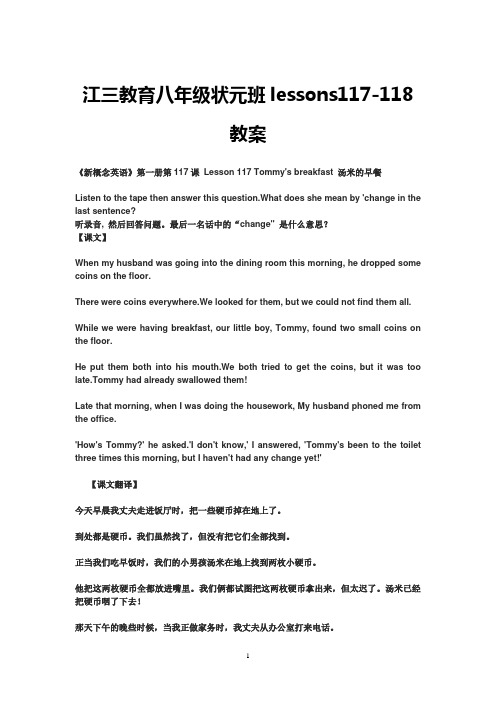
江三教育八年级状元班lessons117-118教案《新概念英语》第一册第117课Lesson 117 Tommy's breakfast 汤米的早餐Listen to the tape then answer this question.What does she mean by 'change in the last sentence?听录音, 然后回答问题。
最后一名话中的“change" 是什么意思?【课文】When my husband was going into the dining room this morning, he dropped some coins on the floor.There were coins everywhere.We looked for them, but we could not find them all.While we were having breakfast, our little boy, Tommy, found two small coins on the floor.He put them both into his mouth.We both tried to get the coins, but it was too late.Tommy had already swallowed them!Late that morning, when I was doing the housework, My husband phoned me from the office.'How's Tommy?' he asked.'I don't know,' I answered, 'Tommy's been to the toilet three times this morning, but I haven't had any change yet!'【课文翻译】今天早晨我丈夫走进饭厅时,把一些硬币掉在地上了。
新概念英语第一册117课课件

Language logic
Detailed description
Through sentence translation exercises, students can learn the language logic of English, improve the fluency and accuracy of English expression.
Vocabulary exercises
Summary words
Vocabulary application
Detailed description
Through vocabulary practice, students can learn how to apply newly learned vocabulary in practical contexts, deepening their understanding of the meaning of vocabulary.
indicates an action in the future or plan, often preceded by "to". For example, "I want to go to the park."
02
Analysis of key and difficult points
Key vocabulary and pd expanded knowledge
English listening and speaking training
Listening training
Provide listening materials related to the content of the text, such as English news, movie clips, etc., to help students improve their English listening skills.
- 1、下载文档前请自行甄别文档内容的完整性,平台不提供额外的编辑、内容补充、找答案等附加服务。
- 2、"仅部分预览"的文档,不可在线预览部分如存在完整性等问题,可反馈申请退款(可完整预览的文档不适用该条件!)。
- 3、如文档侵犯您的权益,请联系客服反馈,我们会尽快为您处理(人工客服工作时间:9:00-18:30)。
沧海一粟;九牛一毛。
Time for listening!
❖ 概念:
1、在过去某个特定的时间正在进 行或发生的动作。
2、当过去的一个动作发生的时候 另外一个动作正在进行。
❖ 结构 1、肯定句:主语+was/were + 现在
分词
I was having breakfast. 2、否定句:主语+was/were not +现
4. I ___ (telephone) a friend when Bob ___ (come) in.
5. While mother ___(put)
Cathy to bed, the door bell ___
(ring).
6. Jane___(wait) for me when I___(arrive).
嘴里塞满食物时不要说话。
❖ swallow v. ① v. 吞下,咽下
Tommy swallowed the coins.
② v. 吞并;侵吞
Our company was swallowed up by an company last year.
我们公司去年被一家美国公司吞并了。
American
❖ later 1) adv. 后来,较迟地,较后地 e.g. three days later 三天后
I was having dinner when he came in.
He came in when I was having dinner
While I was having dinner, he came in.
Mom was reading while Dad was watching ቤተ መጻሕፍቲ ባይዱV.
New concept English 1
Lesson 117
Tommy's breakfast 汤米的早餐
New words and expressions
❖ dinning room
❖ coin
n.
❖ mouth
n.
❖ swallow v.
❖ later
adv.
❖ toilet
n.
饭厅 硬币 嘴 吞下 后来 厕所,换洗室
❖ 过去进行时与一般过去时 ❖ 过去进行时强调过程,不一定完成 ❖ 一般过去时强调事件,一定完成 ❖ I went to school yesterday. ❖ I was going to school at that time. ❖ Tom did his homework last week. ❖ Tom was doing his homework at nine
7. Mike and I___(play) basketball at that time yesterday afternoon.
课文讲解
❖ When my husband was going into the dining room this morning, he dropped some coins on the floor.
在分词
They were not watching TV. 3、疑问句:was/were + 主语+ 现在
分词
Was he writing a letter last night?
❖ 常用时间状语
When, while, a moment ago, from nine to ten last evening, at that time ❖ when既指时间点,也可指一段时间, while只指 一段时间,因此when引导的时间状语从句中 的动词可以是终止性动词,也可以是延续性动 词,而while从句中的动词必须是延续性动词。
o’clock last night.
Practice Time!
1. While she ___ TV, Penny ___ asleep.
A. watches, was falling B. was watching, fell C.was watching, was falling D. watch, fell KEY: B
❖ 此句是过去进行时,结构是was/ were+ doing 表 示过去某个时刻正在进行或发生的动作。
❖ go into 走进,强调“进入”的动作 ❖ 反义词 go out of 走出… ❖ drop 掉下 ❖ 小心,别把花瓶摔了。
Be careful! Don’t drop the vase. ❖ drop 还可以表示丢失,丢掉 ❖ 回家的路上,我把等弄丢了。
❖ There were coins everywhere. We looked for them, but we could not find them all.
❖ everywhere 到处 ❖ look for 寻找(强调动作和过程) ❖ find 找到 (强调寻找的结果) ❖ 我找遍了任何地方都找不到我的钢笔。
e.g. He came later than usual. 他比平常来得晚。
2)adj. 较迟的,较后的,更近的。 e.g. Let’s take a later train. 我们搭晚一点的火车吧。
❖ drop v. (意外)掉落;使掉落 e.g. A drop in the bucket/ocean.
Dining room(hall) 饭厅
Living room
起居室,客厅
Bedroom 卧室
Bathroom
洗浴室,卫生间
Kitchen
厨房
❖coin n. 硬币(可数名词)
e.g. Every coin has two sides.
每个事物都有两面性。
❖ mouth n. 嘴
e.g. Don’t talk with your mouth full!
2. Penny __ dinner when she cut her fingers.
A. had B. having C. was having D. is having KEY: C
3. While we ___ (wait) for the bus, a girl ___(run) up to us.
